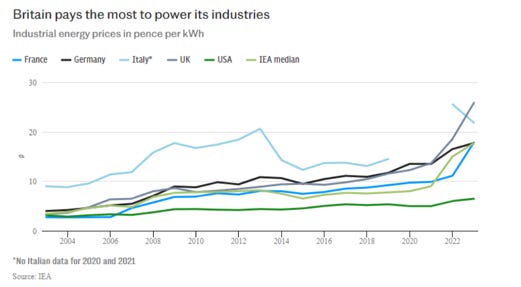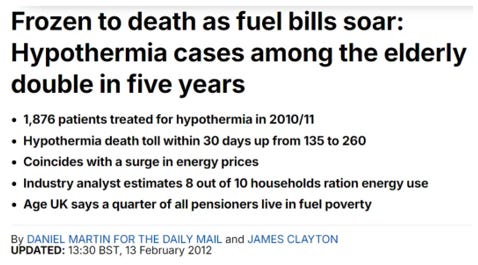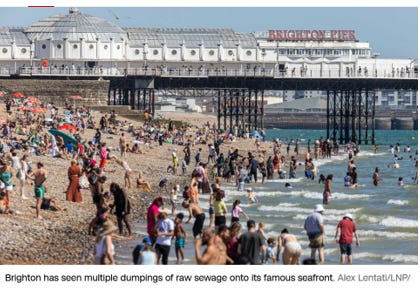DECREPIT BRITAIN - UK Budget – Electricity Prices – Killing Pensioners – Sewerage Crisis – Housing Disaster – Inflation – Cavemen – Starmer’s Ratings - Letter from Great Britain – [11-02-24]
“If we have an economic crisis in the Western world it's because the government makes up 50% or more of the economy. This is a cancer that is taking away people's freedom.” [Marc Faber]
‘I WOULDN’T WISH THIS ON ANYONE’: THE FOOD DELIVERY RIDERS LIVING IN ‘CARAVAN SHANTYTOWNS’ IN BRISTOL. Gig economy workers for Deliveroo and Uber Eats in the city are living in appalling conditions, while putting in long hours, earning low pay and facing mental health problems
Two lines of dirt-encrusted, ramshackle caravans stretch along both sides of a road close to the motorway that winds its way into the heart of Bristol. Rats dart between water-filled concrete sluices to rubbish-flecked mounds of vegetation. Drug users stumble out of the nearby underpass while lorries thunder overhead. This is the grim encampment where about 30 Brazilian delivery riders working for large companies such as Deliveroo and Uber Eats are forced to live to make ends meet.
Celia Campos, 45, has been living in a caravan next to the sluices for a year. “We left Brazil in search of something better,” she says in quickfire Portuguese. “But most of us can’t make those dreams come true. We come back in a worse state than when we left.” It has become much harder for riders to make a living from food deliveries as they claim their earnings have not kept pace with price rises.
While the national living wage is £11.44 an hour, food delivery companies such as Deliveroo and Uber Eats do not formally employ their riders. Instead, they are gig economy workers, paid for each individual delivery. That means workers can end up earning far less than the minimum wage. When your food comes via a delivery app, the exploitation is baked in.
Campos works long hours for both companies and in July says she worked 333 hours, earning the equivalent of £6.27 an hour. Her payment records show she was paid as little as £1.20 for some deliveries by Uber Eats. “We spend as much time on the streets as possible. I work from 8am until I get tired… usually midnight,” she says. “Delivery work is not good any more. You have to be a slave to earn enough.”
She cannot afford soaring rents in Bristol, which have been rising faster than anywhere else in the country and in turn have caused the number of vehicle dwellers to climb in the West Country city. The harsh living conditions, long hours and low pay lead to mental health problems in the encampment. “I was depressed for a year. It was horrible,” says Campos. “I wouldn’t wish it on anyone. If you work, work, work and have no life… that’s where depression comes from.”
Deliveroo, which recently fought off a seven-year legal challenge to secure more rights for gig economy riders, posted its first profit this month, reporting net earnings of £1.3m in the first half of 2024. Uber, which provides taxis and food deliveries, saw its UK pre-tax profits increase from £5m in 2021 to £32m in 2022, with the delivery side of the UK business pulling in £700m in revenues.
The Labour government has promised a new employment rights bill that will ban zero-hour contracts and make sick pay available from day one. But a plan to bring in a single status for all employees, which would give gig economy workers the same rights as employed staff, has been replaced with a pledge to consult on a simpler employment framework.
Some Labour MPs have raised concerns about the links between the party and Deliveroo, as the company has sponsored a series of Labour events. Deliveroo’s chief executive, Will Shu, was invited to a drinks party hosted by Keir Starmer last month. Shu appears in a video recorded at the event and shared on the prime minister’s official X account.
Another of the three women living in the caravans is preparing to work for Uber Eats. Lorena, 28, has been living in a caravan for a year and a half. She says she earns £600 a week working 12 hours every day – equating to £7.14 an hour. “When I arrived here, it wasn’t so bad, but now it has become dehumanising,” she says.
The riders look out for each other, as they say they receive little support from the platforms they log into every day. They protect mopeds, fix each other’s punctures and raise money for injured or sick workers. One compares the kerbside community to a union or “sindicato” and another to a favela – a working-class shantytown in Brazil.
Some still feel vulnerable to street violence. Lorena is scared anti-immigrant protesters may burn their homes. “We feel threatened,” she says. Her neighbour Lucas, 25, is resting in his dilapidated caravan. The window seams are covered with black gaffer tape and the back is covered in tarpaulin. His double bed takes up most of the living space, which measures just five by two metres. Black mould covers the walls above his small camping stove, which is dangerous when used in enclosed spaces. “There is no comfort here [in the caravan]. There is a bed to sleep in and that’s it… sometimes I get demotivated,” he says.
On the other side of the road, another rider is getting ready to go out on his moped. Freitas, 32, is a qualified pharmacist in Brazil but delivers takeaways in the UK. Figures on his Uber Eats app show he was paid on average £3.43 a delivery. “I studied for five years. I wouldn’t like to tell my family what’s going on here,” he says. He is desperate to move because his caravan has no power, no heating and nowhere to cook. The windows leak over his bed when it rains. “It is a struggle to live like this. You have to wrap yourself in a blanket at night,” he explains. “Many of the people who stay here end up having mental problems because they live in a small cube.”
Heather Mack, deputy leader of Bristol city council, says: “Most of us seek to treat others the way that we would like to be treated, yet shamefully this is not what we see from firms like Deliveroo and Uber Eats in our city. Those who work for a living should earn a living which can provide them with the essentials that we all need: safety, sanitation and food.” Mack also called on the government to end the “cruel hostile environment” policy to give migrants a route to legal work.
The Independent Workers’ Union of Great Britain (IWGB) – which led the unsuccessful legal campaign to secure employment rights for riders – said the Bristol encampment was “emblematic of the misery mass-produced by the gig economy”. Maritza Castillo Calle, IWGB vice-president, accused delivery companies of slashing riders’ pay to push up their bottom line. “We must make no mistake that Deliveroo posted its first-ever profit last week as a direct result of its workers facing new depths of deprivation,” she says.
Deliveroo said it was “very concerned” about riders living in unsuitable conditions and would contact Bristol city council. A spokesperson added: “Deliveroo offers the flexible work riders tell us they want, attractive earning opportunities and protections including free insurance, sickness cover, financial support when riders become new parents and a range of training opportunities.”
Uber said Uber Eats offered a flexible way for thousands of couriers to earn money: “Couriers can access a range of protections, including on-trip insurance, when they work with us, and we regularly engage with couriers to look at how we can improve their experience.”
Back in Bristol, Campos climbs on to her scooter. She is exhausted from the long hours she put in last night but says she needs to work again. “You have to make a lot of deliveries if you are getting paid one or two or three pounds for each drop-off ... the owners of these companies do not think about us riders, who make them their money – they only think of themselves.” Source
Having no rights or stability wrecks your mental and physical health. The Employment Rights Bill isn’t enough to change that.
STOP PRESS – UK BUDGET 2024
The International Monetary Fund has welcomed the measures announced by Rachel Reeves in her budget on Wednesday but it has been greeted with mixed responses from various observers and especially the markets. In a rare move from the influential financial watchdog, it backed the increase in investment and spending on urgent public services pressures as well as “sustainable” tax rises.
Britain’s ‘block-buster’ budget has delivered “short-term living standards pain in the hope of long-term growth-based gains", according to the Resolution Foundation. The thinktank said the first Labour budget in almost 15 years marked a “decisive shift” from the planned cuts set out by the last government, with better-funded public services and greater public investment coming from higher taxes and more borrowing.
But the budget has not yet delivered a decisive shift away from Britain’s record as a"‘stagnation nation", with the outlook for growth and living standards remaining weak, having not grown for over 25 years; growth died in the 21st century:
Why should anything change now, regardless of political machinations? Britain will remain in a minimal growth scenario as it gradually declines. By prioritising extra spending on public services and investment, the chancellor is borrowing an extra £32bn a year by the end of the parliament, with another £41bn coming from tax rises.
Mike Brewer, the interim chief executive of the Resolution Foundation, said: "Rachel Reeves’s first ever Budget was never going to be a crowd-pleaser, given the profound and often conflicting challenges she faced, from failing public services to perilous public finances, weak growth and stagnating living standards.
"The short-term effect of these changes will be better funded public services, not just across schools and the NHS, but, critically, also in our justice system. Families are also set for a further squeeze on living standards as the rise in employer national insurance dampens wage growth.
Bond yields once more touched their highest point this year on Friday, as investors continued to digest the implications of the first Labour budget in 14 years. The yield, effectively the government’s borrowing cost on the benchmark 10-year bond, reached 4.526% in global trading, matching the level hit on Thursday in the aftermath of Rachel Reeves’s budget statement as investors predicted a slower pace of interest rate cuts from the Bank of England. Since then it has fallen back slightly to 4.456%.
Scrutiny of bond market movements has been particularly intense after the budget because of the large borrowing set out by Reeves, alongside major tax increases. However, while there has been a noticeable reaction in the market for government bonds, also known as gilts,
"With Britain finally turning the page on its longstanding failure to invest thanks to a £100bn boost to public capital spending, the hope is that this short-term pain will eventually turn into a long-term living standards gain. But if it doesn’t, future budgets won’t be any easier to deliver, especially if further tax rises are needed." Read more here.
The OBR’s damning Budget verdict has given the Tories ammunition for years, says Fraser Nelson in the Telegraph. When it seemed politically expedient Labour pledged its devotion to the OBR. It is about to face the consequences. Here’s an excerpt.
NEWS FLASH – BRITAIN’S ELECTRICITY PRICES ARE HIGHEST IN THE WORLD
British companies are paying the highest electricity prices of anywhere in the developed world, official data have shown, after costs more than doubled in the past five years. The Telegraph has the details.
The cost of power for industrial businesses has jumped 124% in just five years, according to the Government’s figures, catapulting Britain to the top of international league tables. It is now about 50% more expensive than in Germany and France, and four times as expensive as in the U.S.
The figures will fuel concerns about the future of U.K. industry amid warnings that high energy prices are crippling domestic manufacturers. They underline the challenge facing Ed Miliband, the Energy Secretary, who wants industrial businesses to switch away from gas to electricity-powered processes.
Frank Aaskov, the Director of Energy at lobby group U.K. Steel, noted that high industrial electricity prices have for too long damaged the competitiveness of British steelmaking, and many in the wider manufacturing sector will be feeling the same pressure as steel companies.
“The Government should tackle steep electricity costs and make Britain a fruitful place to invest, while enabling growth and improving competitiveness.” The electricity price paid by industrial users per kilowatt hour rose to 25.85p in 2023, the data show. That compares to 10.43p as recently as five years earlier and 8.89p a decade ago.
It also far outstripped European rivals and allies such as the U.S. and Canada. The equivalent price was 17.84p in France, 17.71p in Germany and 6.48p in the U.S. Across all the 31 member countries of the International Energy Agency, which collates the data, the median price was 17.70p per kilowatt hour, with Britain’s price higher than any other country. Energy bosses are due to meet the minister whose brief includes fuel poverty.
There are major consumer energy issues, amid scrutiny on the government and industry ahead of a winter during which support for some pensioners has been withdrawn. Miatta Fahnbulleh was elected MP for Peckham in July. She was formerly the chief executive of the New Economics Foundation, a leftwing thinktank, but now she has the ministerial brief of looking after energy consumers, including fuel poverty.
That role was thrust into the spotlight early in the Labour government’s term, after the chancellor, Rachel Reeves, limited the winter fuel allowance to those eligible for pension credit. The benefit was previously applied universally, but some Labour MPs have said they are worried about pensioners just above the threshold. Source
Firms scramble as Britain pays the highest electricity bills in the world https://www.gbnews.com/money/energy-bill-warning-britain-pay-highest-in-world
NOTHING SAYS "OUR VALUES" LIKE REDUCING DEFICITS BY KILLING PENSIONERS.
Britain's new Prime Minister Sir Keir Starmer has recently announced his government's plan to cut winter fuel subsidies to 10 million pensioners in Britain. In May this year Starmer boldly confronted his predecessor, Rishi Sunak: "So will [the Prime Minister] now rule out taking pensioners' winter fuel payments off them to help fund his £46 billion black hole?"
Starmer already knew about the black hole and said it was £46 billion, not £22 billion; maybe science has changed since May 2024. Labour is now in government and, confronted with the 22 billion-size black hole, they no longer see what the big fuss with killing pensioners was all about. And it’s not exactly like this is a new thing - here’s a Daily Mail headline from 12 years ago:
Source
The coming collapse of Britain: “Everything points to a horrific cliff-edge looming; an avalanche of debts, defaults, evictions and unpaid bills to follow.”
FUN TIDBIT – NEVER FEAR DRONES!
THOUGHT FOR WEEK - 20 years ago a South African friend described Britain as a shi*tty little island
Near the southwest tip of England, where the region of Cornwall meets the Atlantic, is Longrock Beach. It’s part of the mythical coastline around Penzance, a liminal space where the sky meets the ocean with the off-shore fairytale castle of St. Michael’s Mount.
Longrock is idyllic, safe and family friendly, with shallow water, and “favoured with Penzance locals,” according to the tourist board. Last week it was rather less so. Longrock was one of 100 beaches around England which had raw sewage disgorged into the sea during the peak summer period. In Cornwall alone, 14 of 80 bathing beaches were off limits due to sewage.
A beach in Brighton and Hove, perhaps the most popular seaside escape for Londoners, is also closed. According to charity Surfers Against Sewage, the southern coast is the worst affected. “Brighton and Hove seem to be deluged over and over again,” says CEO Hugo Tagholm.
The problem for water companies is when the volume in the pipes becomes too much, rather than backing up into homes and streets, it’s pumped out of 15,000 storm overflows around the country, which empty into rivers and the sea. It’s not only affecting beaches. Only 14% of rivers meet “good ecological standards,” according to a 2021 report.
Water companies in Britain were privatised in 1989. There are now nine companies operating in England, seven of which were responsible for “an increase in serious incidents” last year – profit before safety? Sources
Sewage-covered beaches risk turning England into the ‘dirty man of Europe’ https://edition.cnn.com/travel/article/uk-beaches-sewage-england/index.html
United Kingdom declared a national incident after vaccine-induced poliovirus was found in sewage samples in North and East London https://www.ukcolumn.org/blogs/back-to-the-past-a-reemergence-of-victorian-diseases
E.coli outbreak put at least 86 people in hospital https://www.bbc.com/news/articles/cedd0947e73o
Shellfish industry is on a 'knife edge' as sewage dumped in designated waters for 192,000 hours last year https://news.sky.com/story/shellfish-industry-on-a-knife-edge-as-sewage-dumped-in-designated-waters-for-192-000-hours-last-year-13126372
BREAKING NEWS: Don't forget to follow this link at UK Column which is a truly independent, multimedia, and real-news website: supported by its members
BRITAIN’S NEW-BUILD HOUSING IS A DISASTER!
While developers Kendrick Homes gloats of “our commitment to quality, detail, design and pride shows in the homes we build” and how “behind our quality new build homes lies a century of craftsmanship”, its residents say otherwise.
“This was meant to be the perfect home, I was so excited to get in,” said the 32-year-old, who shares the property with her Labradors Atlas and Dudley. But alarm bells began ringing when problems with the home pushed Livvy’s move in date back four months – which nearly cost her the buyer on her previous property.
Mateusz Florczak, who is originally from Poland, worked hard to buy his £360,000 home with his girlfriend but has been left disgusted at how Kendrick have treated him.
“They dug up our drive three times, they asked once if they can do it,” the engineer explained. “One day I came back from work, saw a massive digger in my driveway and a hole two metres deep. Nobody ever told me.” The house appeared in good condition when the couple first set foot in it last September but by the second day the sink and shower had leaked – wrecking the ceiling in the downstairs toilet.
1.5 Million Homes in Five Years? Are You Joking? - https://dailysceptic.org/2024/08/29/1-5-million-homes-in-five-years-are-you-joking/
INFLATION MONITOR
Briain’s CPI inflation has fallen below the country’s 2% target for the first time in three and a half years according to the September data at 1.7%, down from 2.2% in August but food inflation increased at 1.9%. Services inflation fell but at 4.9% remains higher, again remaining sticky.
Core CPI (which strips out energy, food, alcohol and tobacco) rose by 3.2% in the 12 months to September 2024 and this is an indicator that the BoE follows and it remains sticky. Britain is not out of the inflation woods yet.
SURVIVAL MONITOR - The People Living in Caves Deep Beneath a British City
The man, an ex-serviceman, said he has been 'living' in a cave for years due to the city's soaring housing and rental prices. Bristol is the fourth most expensive place to live in Britain, after London, Cambridge, and Oxford. "Things have got so bad in Bristol that people have literally reverted back to the Stone Age and are now inhabiting caves." Sources
A statement on Bristol City Council's website reads: "It's very unlikely that you'll be offered a council property because the waiting list is very long. https://www.somersetlive.co.uk/news/local-news/i-met-people-living-caves-9634541?utm_source=somerset_live_newsletter&utm_medium=email&utm_campaign=main_daily_newsletter&utm_content=&utm_term=&ruid=1972e781-c16b-460e-bc4c-faeaabc797a6
Keir Starmer has said the state will “take back” more “control” of people’s lives. His speech last month included the words “control” or “uncontrolled” 15 times –marked a stark contrast to his first speech as PM in July, in which he told the public he would “tread more lightly on your lives” https://dailysceptic.org/2024/09/25/the-state-will-take-back-control-of-peoples-lives-says-starmer/
NARRATIVE BATTLE – PM Starmer is not popular, to say the least
A new poll shows almost two-thirds of voters think the government is more interested in serving its own interests than those of ordinary people, reported by the Telegraph:
“Starmer’s approval rating at lowest on record amid cronyism scandal” . “Even Labour thinks the Blob is incompetent”. There’s a reason why the government is resorting to ‘cronyism’. The Civil Service model is broken, says David Frost in the Telegraph. Source
Maybe this is why? “Toby Young warns of ‘chilling’ crackdown on free speech” – On the Telegraph’s Planet Normal podcast, Liam Halligan and Allison Pearson speak to Toby about Starmer’s riot crackdown. https://www.spectator.co.uk/article/the-death-of-free-speech-in-britain/
FINALLY
COMING NEXT:
BOOM's Weekly Global Review on Tuesday, November 5, 2024
The Financial Jigsaw Part 2 – GLOBAL GOVERNMENT - Saturday, November 9, 2024
REFERENCE - My Books: “The Financial Jigsaw” Parts 1 & 2 Scroll: https://www.researchgate.net/publication/358117070_THE_FINANCIAL_JIGSAW_-_PART_1_-_4th_Edition_2020 including regular updates.
















Ain't it time to get the "gubment" out of folks business - I mean tonight where I reside - we got to set the clocks back an hour - for what I wonder - gubment in our business I reckon - eff that.
Enough is enough - and too much gubment means ole fellas get a chair to change the time in a clock endless, and then they fall and break their back and die - for what?
Daylight savings time my ass!
~
😂
Thank you for describing the shameful decline of my country.
I could add many more deprivations but perhaps the worst is the fact that we are being trained to accept a diminution of standards, expectations and personal values. We are, of course, well along the road to an inglorious transhuman future where a toaster will enjoy more status than humans.
Nevertheless, I still retain some confidence that, after we hit rockbottom, those that survive will be motivated enough to elevate humanity back up to our rightful, insightful and compassionate state.
Wishing you a lovely, healing week, AP.